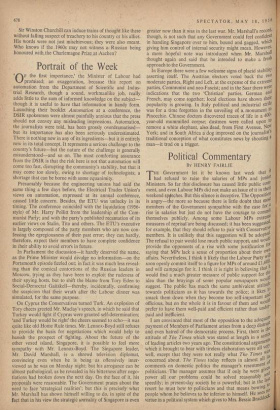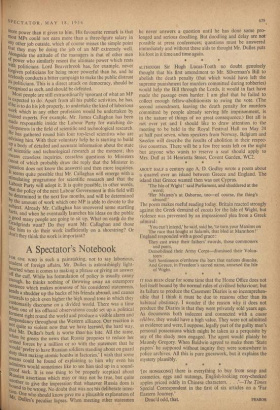Political Commentary
By HENRY FAIRLIE
rr HE Government let it be known last week that it had refused to raise the salaries of MPs and julli°t Ministers. So far this disclosure has caused little public cony ment, and even Labour MPs did not make an issue of it in their weekend spOeches. But this silence is deceptive. The Opposit0 is angry—the more so because there is little doubt that 11Wsl members of the Government sympathise with the case for rise in salaries but just do not have the courage to comulit themselves publicly. Among some Labour MPs extra measures of reprisal'are being discussed; it has been suggest for example, that they should refuse to pair with Conservalive members. It is unlikely that this suggestion will be adopted' The refusal to pair would lose much public support, and would provide the opponents of a rise with some justification fel' saying that MPs lack a sense of proportion about their nwil affairs. Nevertheless, I think it likely that the Labour Party Will soon openly commit itself to a figure for MPs of around £1,6°°' and will campaign for it. I think it is right in believing that it would find a much greater measure of public support for the idea than the brayinss of some popular newspapers would suggest. The public has much the same ambivalent attitude towards politicians as it has towards the police; it likes tu, smack them down when they become too self-important 00 officious, but on the whole it is in favour of them and would prefer to have them well-paid and efficient rather than under' paid and inefficient. I am convinced that most of the opposition to the adequat° payment of Members of Parliament arises from a deep distrust and even hatred of the democratic process. First, there Is tile
es
attitude of The Times which was stated at length in a sell of leading articles two years ago. The constitutional arguments which it brought to bear with tireless elaboration were all verY well, except that they were not really what The Times Was its concerned about. The Times today reflects in almost all comments on domestic politics the manager's resentmen! politicians. The manager assumes that if only he were give power all our problems could be solved reasonably dud speedily; in present-day society he is powerful; but in the last resort he must bow to politicians and that means bowing to people 'whom he believes to be inferior to himself. He sees , virtue in a political system which gives to Mrs. Bessie Bradduei` more power than it gives to him. His favourite remark is that most MPs could not earn more than a three-figure salary in anY other job outside, which of course misses the simple point rliat they may be doing the job of an MR extremely well, illongside the attitude of the managers is that of other men of power who similarly resent the ultimate power which rests ,with politicians. Lord Beaverbrook has, for example, never 'orgiven politicians for being more powerful than he. and he t,irelessly conducts a bitter campaign to make the public distrust Its politicians. This is a direct attack on democracy, should be recognised as such, and should be defeated. , Most people are still extraordinarily ignorant of what an MP Is expected to do. Apart from all his public activities, he has, IL he is to do his job properly, to undertake the kind of laborious work which in any other profession would be undertaken by trained experts. For example. Mr. James Callaghan has been made responsible inside the Labour Party for watching de- v,eloPments in the field of scientific and technological research. tIC has gathered round him four top-level scientists who are tnivising him. With their voluntary help he is starting to build Up a body of detailed and accurate information about the state of scientific and technological -research at the moment; this Meill1S ceaseless inquiries, ceaseless questions to Ministers (most of which probably draw the reply that the Minister in Iluestion does not know the answers) and then more inquiries. t,SeeMS quite possible that Mr. Callaghan will emerge with a sttnnulating programme for scientific research and that the ,tahotir Party will adopt it. It is quite possible, in other words, tu'at the policy of the next Labour Government in this field will ?e determined in the next few months, and will be determined °Y the amount of work which one MP is able to devote to the subject. Already Mr. Callaghan has uncovered some startling acts, and when he eventually launches his ideas on the public a_good many people are going to sit up. What on earth do the "1.1.radgrinds want? Do they want Mr. Callaghan and those him to do their work inefficiently on a shoestring? Or °n 't they think the work is important?



































 Previous page
Previous page